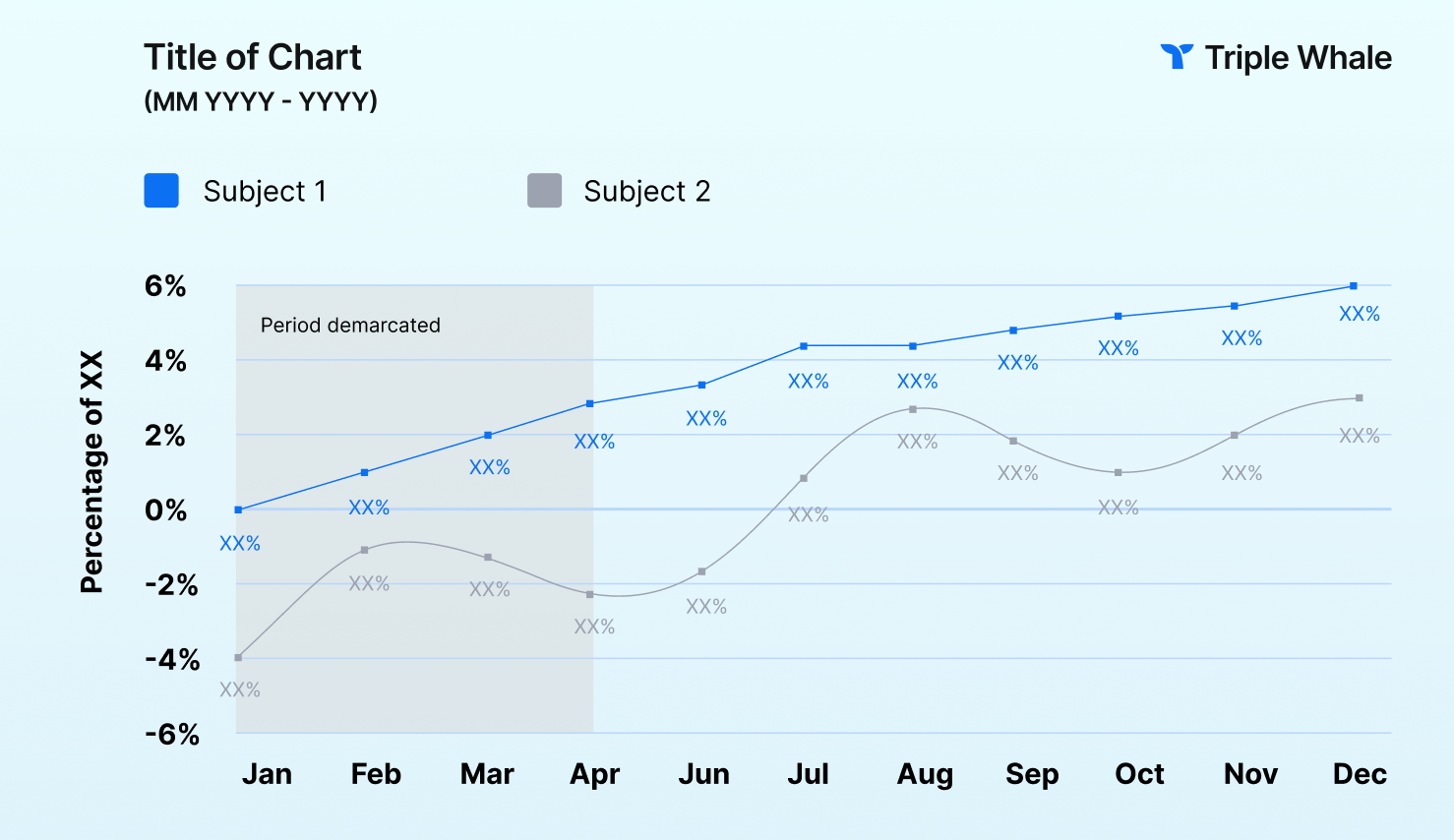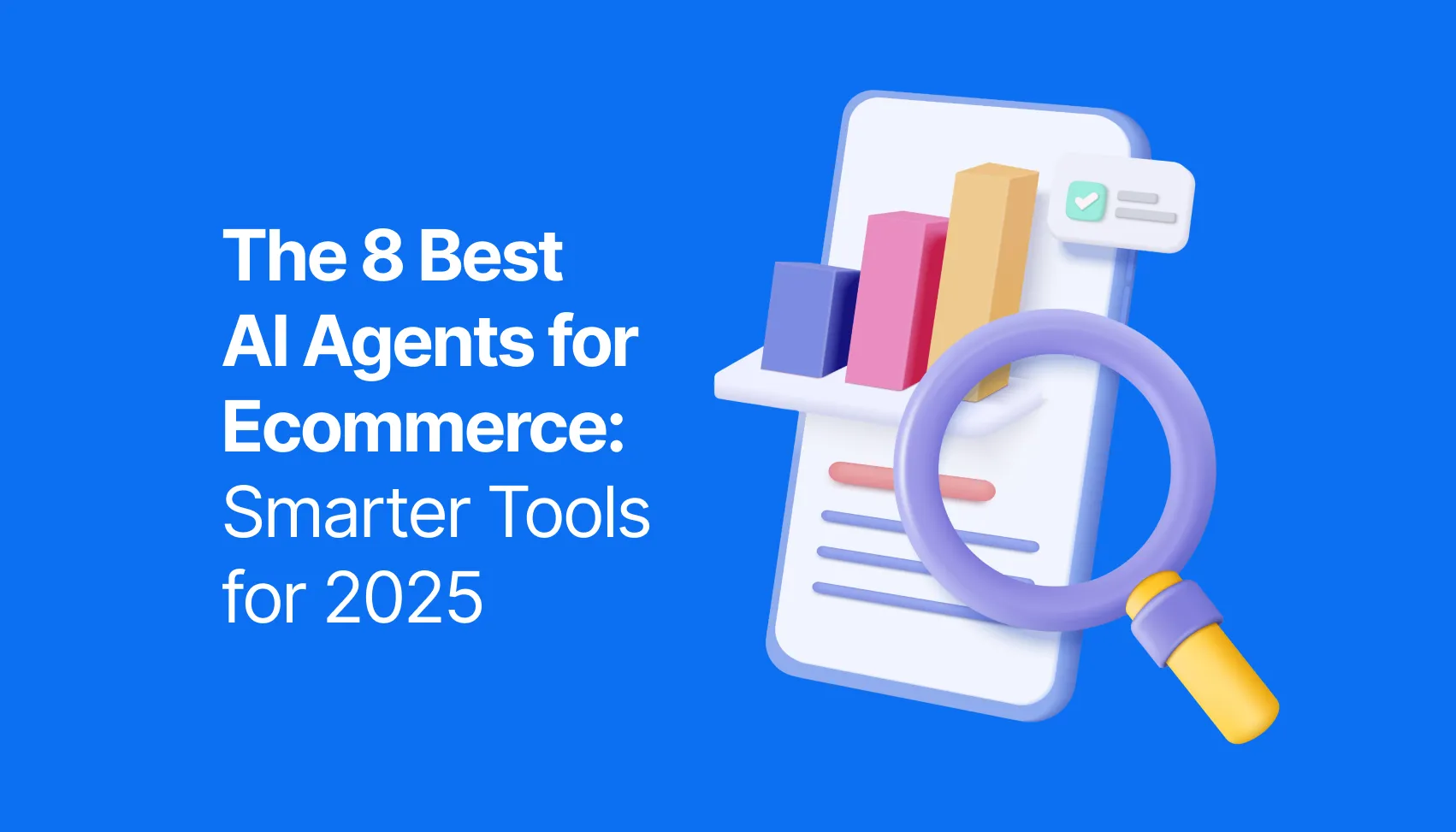
Ecommerce businesses are readily integrating AI agents into their operations, as they move past simple chatbots to autonomous systems that can think, decide, and act. Unlike traditional automation tools that follow rigid scripts, intelligent ecommerce AI agents can adapt to complex situations, learn from interactions, and deliver personalized experiences that drive customer satisfaction and revenue growth.
AI-driven ecommerce is here, and the market is expected to grow to $8.65 billion in 2025. If you’re an ecommerce brand, you should be integrating AI agents in your operations now, or else you’ll be left behind.
In this blog, we’ll evaluate the top AI agents for ecommerce and compare their capabilities, pricing, and real-world performance to help you choose the right solution for your business.
An AI agent is an autonomous software system that can perceive its environment, make decisions, and take actions to achieve specific goals – all without any human intervention. An ecommerce agent is able to understand context and reason through complex problems, as well as execute multi-step tasks.
The difference between agentic AI and generative AI is crucial for ecommerce businesses. While generative AI creates content based on prompts, agentic AI takes autonomous action to complete complex agentic workflows and solve problems in real time.
Understanding the difference between these tools will help ecommerce businesses make informed decisions:
For businesses exploring broader AI tools for ecommerce, understanding the differences is essential for building an effective AI strategy that goes beyond basic AI in ecommerce applications.
Which AI agents are best for ecommerce? Here’s a list!
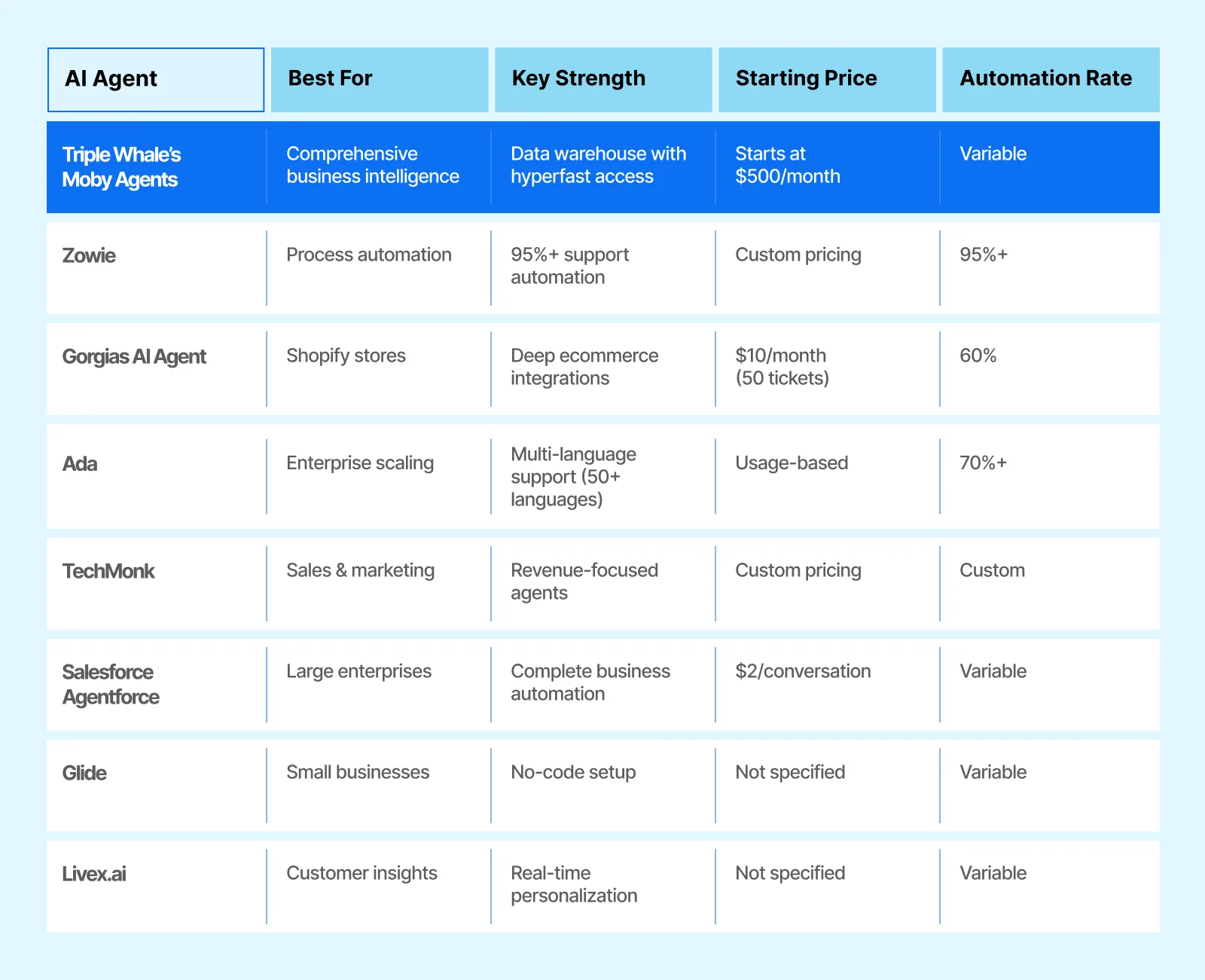
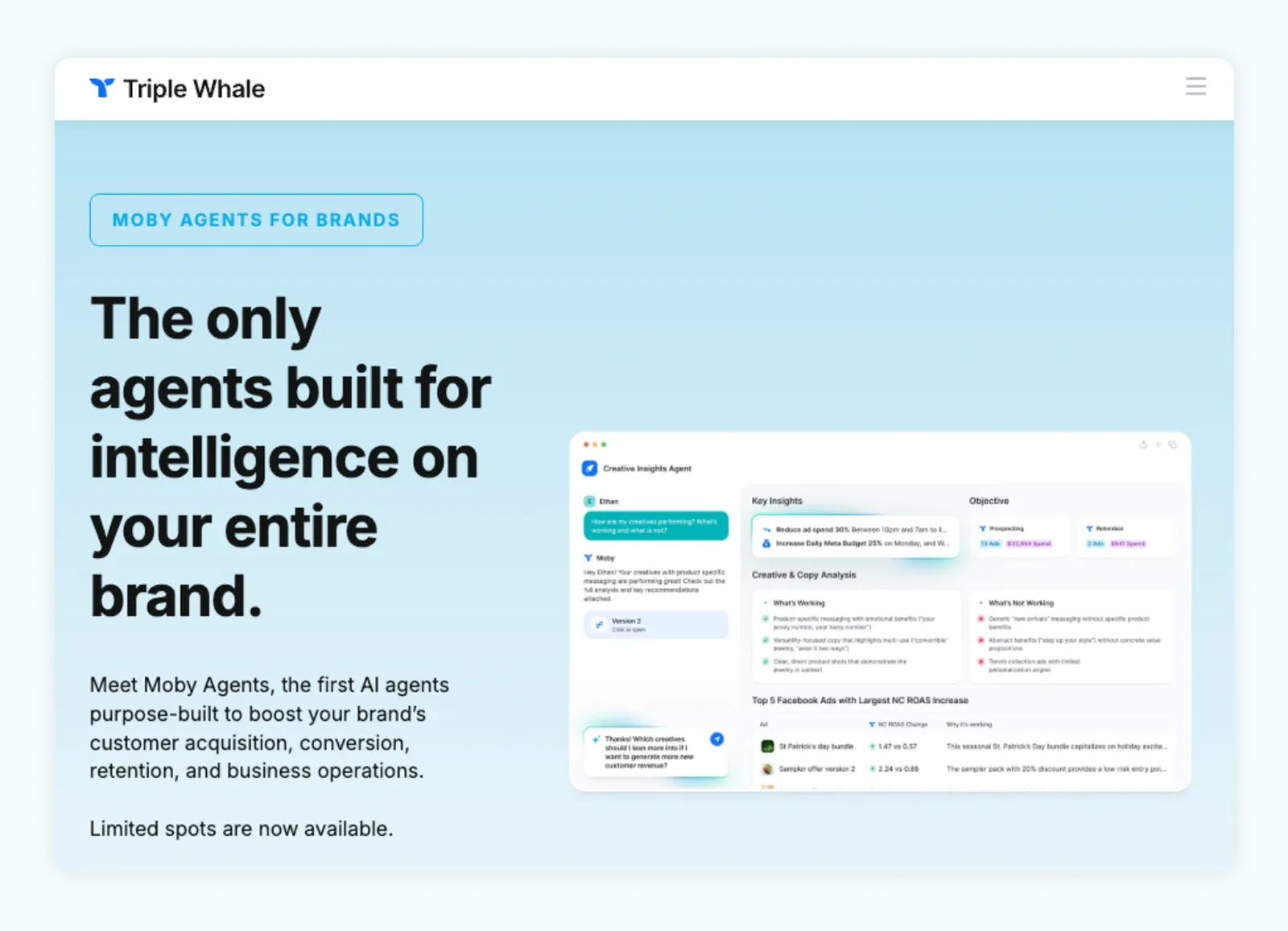
Triple Whale’s Moby Agents are the first AI agents purpose-built specifically for ecommerce intelligence, designed to accelerate customer acquisition, conversion, retention, and business operations through advanced analytics.
AI agent capabilities: Moby Agents sit on top of Triple Whale’s fully-managed data warehouse with universal schema for hyperfast data access. They’re trained on data from over $55 billion in revenue across more than 30,000 brands, providing contextually-relevant recommendations based on retail expertise and seasonal patterns.
Used for:
Pricing: Starting at $500/month, pricing is based on annual revenue and features needed
Pros:
Cons:
Ratings: G2, 4.6
Best for: Data-driven ecommerce brands and agencies looking for comprehensive business intelligence and analytics built specifically for retail operations.
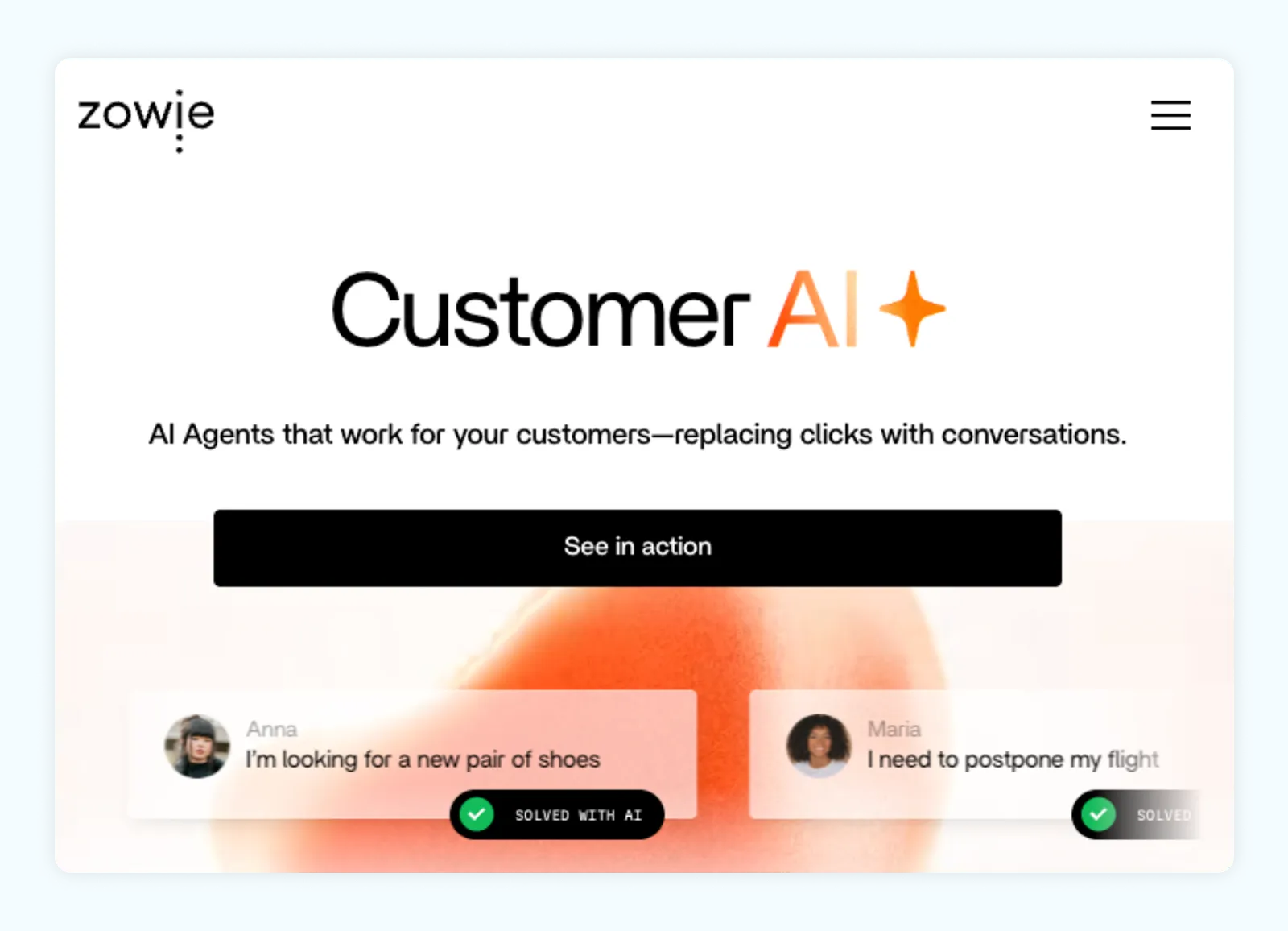
Zowie stands out as the most comprehensive AI agent platform for ecommerce operations, automating 95%+ of customer support inquiries while handling complex workflows from start to finish.
AI agent capabilities: Zowie’s proprietary X2 engine is trained on over 100 million ecommerce support interactions. The platform features three core technologies: Zowie X2 for response generation, Decision Engine for 100% accurate execution, and Reasoning Engine for contextual understanding.
Used for:
Pricing: Custom pricing based on business needs and volume
Pros:
Cons:
Ratings: G2, 4.7
Best for: Fast-scaling DTC brands, omnichannel retailers, and enterprise ecommerce businesses ready to fully automate customer service.
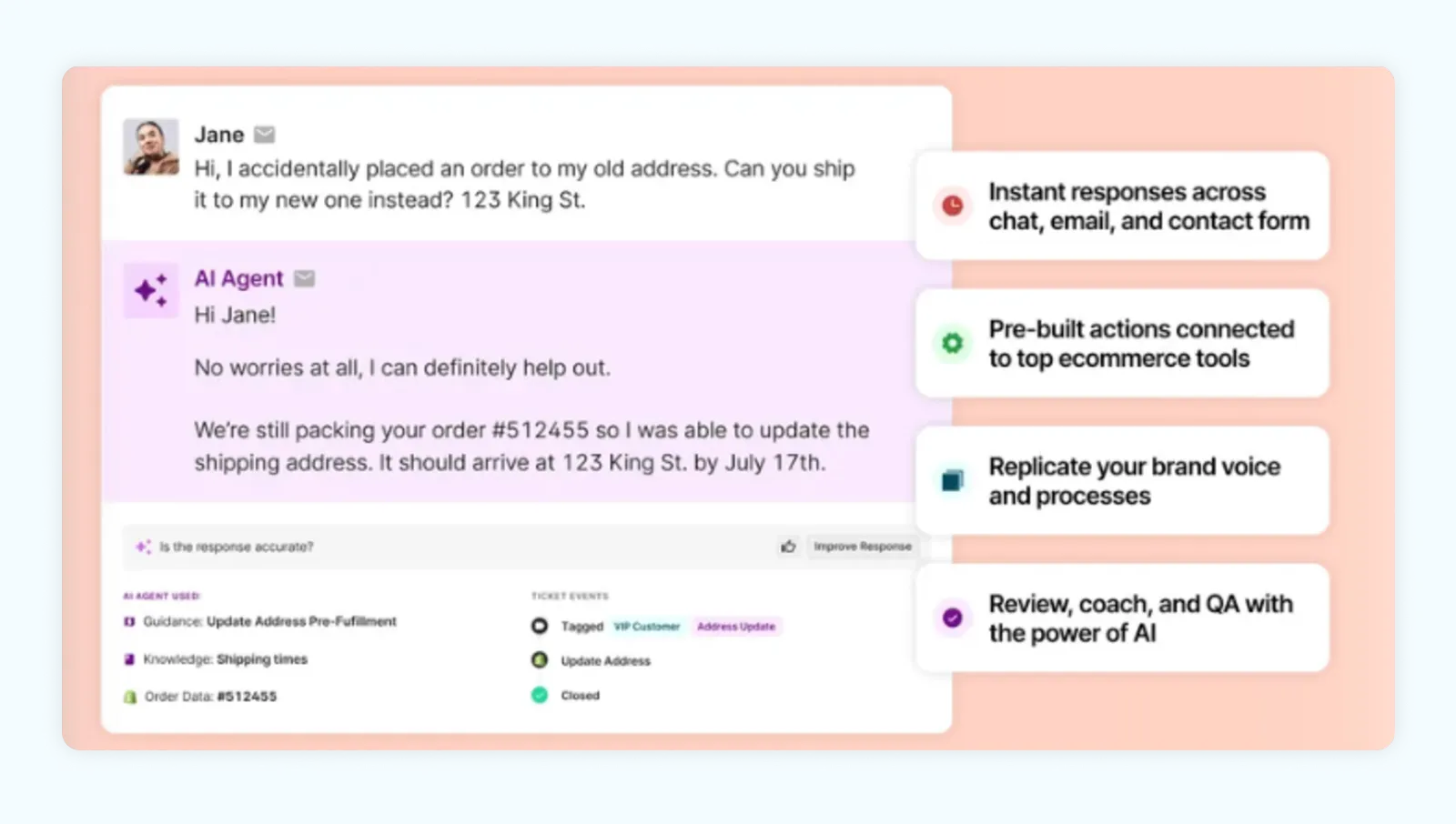
Gorgias’s AI Agent is specifically designed for ecommerce brands, with a deep Shopify integration and the ability to handle complex customer service and sales tasks autonomously.
AI Agent capabilities: The AI Agent can edit Shopify orders, process returns, manage subscriptions, and provide product recommendations. It learns brand voice and policies while maintaining full visibility into decision-making processes.
Used for:
Pricing: Starts at $10/month for 50 tickets, scales to $900/month for 5000 tickets. Additional fees for automation: $0.33-$2.00 per automated interaction.
Pros:
Cons:
Ratings: G2, 4.6
Best for: Shopify and Shopify Plus merchants looking for seamless ecommerce-specific automation with transparent pricing.

Ada provides enterprise-grade AI agents with exceptional multi-language capabilities and advanced conversation management across all customer touchpoints.
AI agent capabilities: Ada’s Reasoning Engine™ understands context, isolates issues, and creates action plans. The platform supports 50+ languages and integrates with business systems for personalized, authenticated customer interactions.
Used for:
Pricing: Usage-based pricing for resolved conversations (exact pricing not publicly available)
Pros:
Cons:
Ratings: G2, 4.6
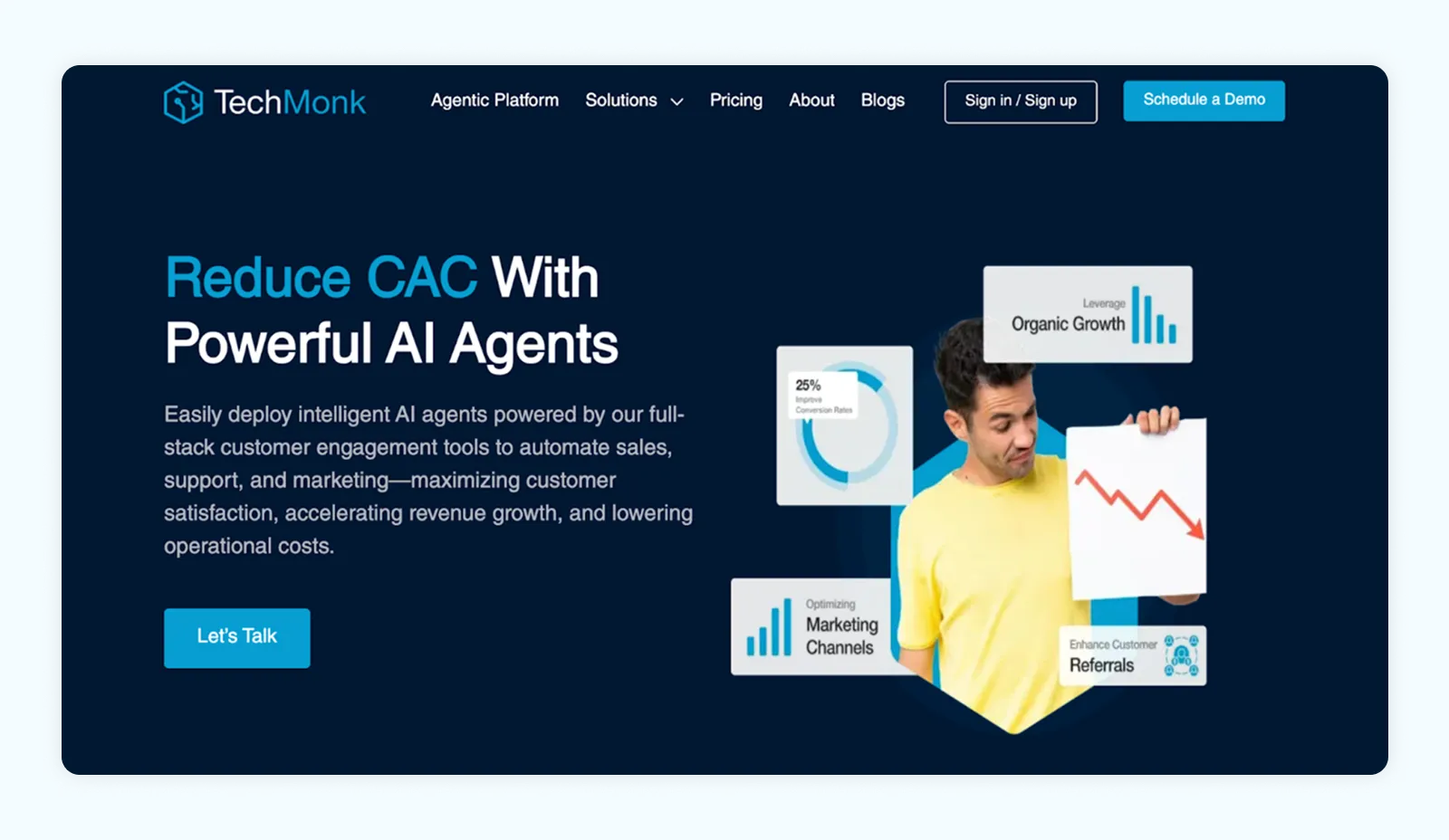
TechMonk offers specialized AI agents designed specifically for driving ecommerce sales and improving conversion rates through intelligent customer interactions.
AI agent capabilities: TechMonk provides distinct agents: Sales AI Agents that focus on closing deals and reducing acquisition costs, and Support AI Agents that handle customer service while maintaining sales opportunities.
Used for:
Pricing: Custom pricing based on business requirements
Pros:
Cons:
Best for: Ecommerce businesses prioritizing sales growth and conversion optimization over basic customer support.
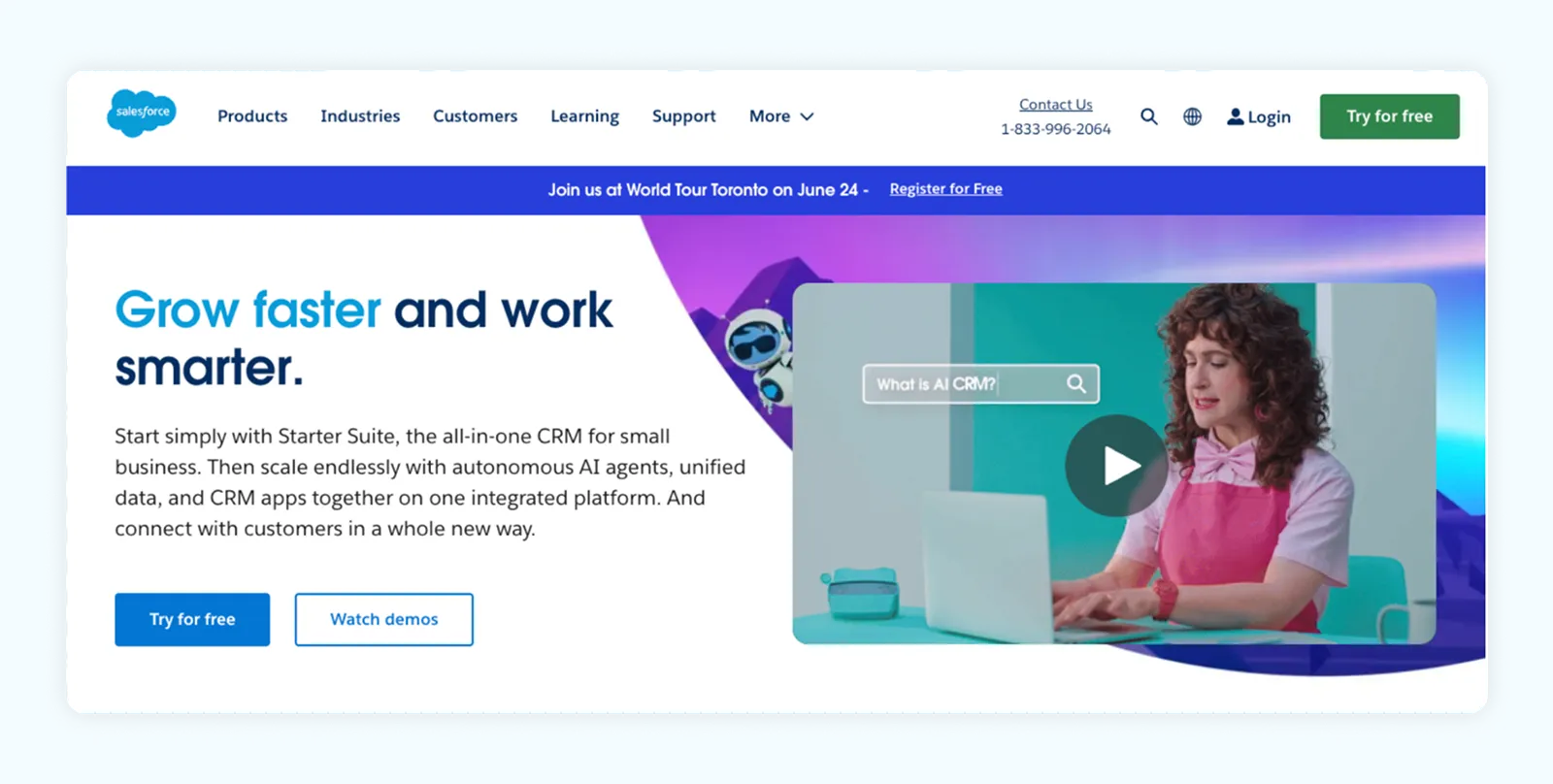
Salesforce Agentforce provides comprehensive AI agents that integrate across entire business operations, extending beyond customer service to sales, marketing, and commerce functions.
AI agent capabilities: Built on the Salesforce platform with the Atlas Reasoning Engine, Agentforce agents can handle complex business processes, integrate with existing workflows, and take autonomous actions across departments.
Used for:
Pricing: Approximately $2 per conversation, with enterprise custom pricing available.
Pros:
Cons:
Best for: Large enterprises with complex operations requiring comprehensive business automation across multiple departments.
Ratings: G2, 4.4
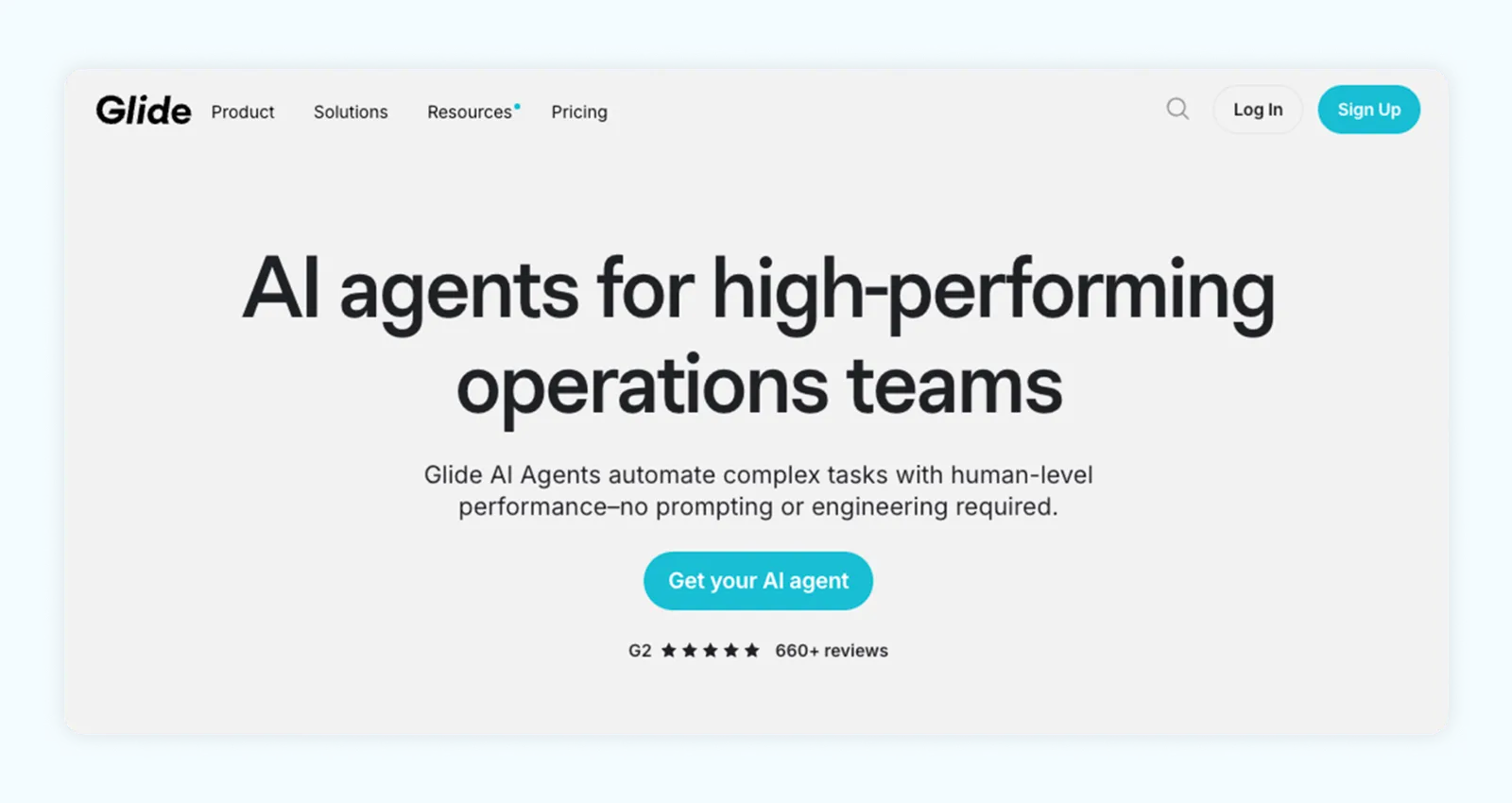
Glide offers an intuitive, user-friendly platform that allows small ecommerce businesses to build and deploy AI agents without technical expertise.
AI agent capabilities: Features drag-and-drop workflow builder, automated customer support, order tracking, and personalized customer outreach. The AI learns quickly and adapts to business needs.
Used for:
Pricing: Not publicly specified, but positioned for small business budgets
Pros:
Cons:
Ratings: G2, 4.7
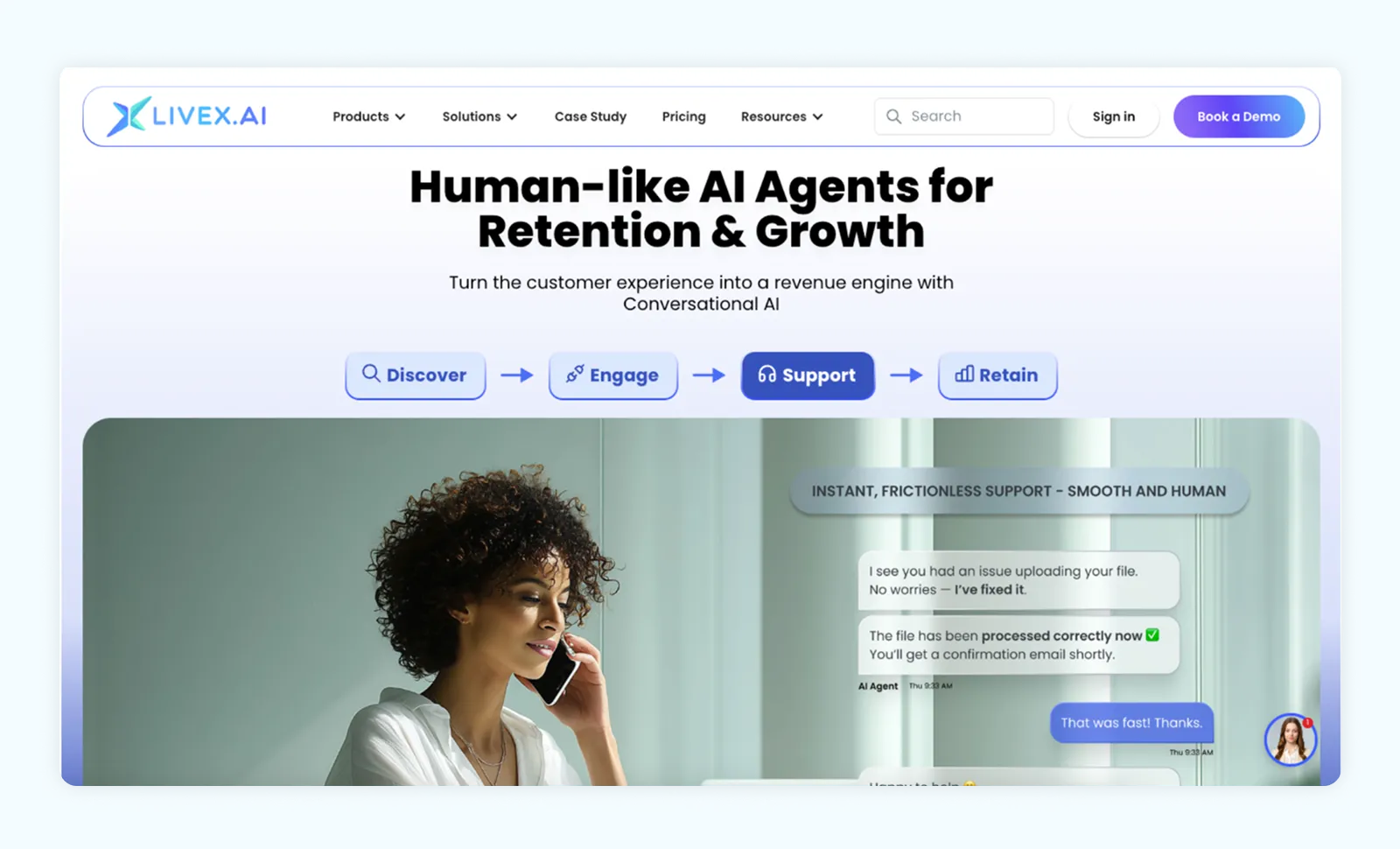
Livex.ai focuses on creating highly personalized customer experiences through AI agents that adapt in real-time based on customer behavior and preferences.
AI agent capabilities: Advanced personalization engine that analyzes customer behavior, provides real-time recommendations, and creates tailored shopping experiences for each individual customer.
Used for:
Pricing: Not publicly available
Pros:
Best for: Ecommerce businesses prioritizing personalized customer experiences and willing to invest in advanced AI capabilities.
To select the appropriate AI agent, you should carefully consider the following factors:
AI agents represent the future of ecommerce operations, as they continue to make business operations easier and more efficient. Each of the AI agents included in this blog would transform an ecommerce business’s operations, whether it is in customer service, producing websites with no coding experience necessary, or taking your business intelligence to the next level – AI agents are already everywhere, and this is only the beginning for this type of AI tool.
If you’re ready to see how ai and ecommerce go hand-in-hand, download The Ultimate AI Agents Playbook for Ecommerce Brands for actionable tactics!

Ecommerce businesses are readily integrating AI agents into their operations, as they move past simple chatbots to autonomous systems that can think, decide, and act. Unlike traditional automation tools that follow rigid scripts, intelligent ecommerce AI agents can adapt to complex situations, learn from interactions, and deliver personalized experiences that drive customer satisfaction and revenue growth.
AI-driven ecommerce is here, and the market is expected to grow to $8.65 billion in 2025. If you’re an ecommerce brand, you should be integrating AI agents in your operations now, or else you’ll be left behind.
In this blog, we’ll evaluate the top AI agents for ecommerce and compare their capabilities, pricing, and real-world performance to help you choose the right solution for your business.
An AI agent is an autonomous software system that can perceive its environment, make decisions, and take actions to achieve specific goals – all without any human intervention. An ecommerce agent is able to understand context and reason through complex problems, as well as execute multi-step tasks.
The difference between agentic AI and generative AI is crucial for ecommerce businesses. While generative AI creates content based on prompts, agentic AI takes autonomous action to complete complex agentic workflows and solve problems in real time.
Understanding the difference between these tools will help ecommerce businesses make informed decisions:
For businesses exploring broader AI tools for ecommerce, understanding the differences is essential for building an effective AI strategy that goes beyond basic AI in ecommerce applications.
Which AI agents are best for ecommerce? Here’s a list!


Triple Whale’s Moby Agents are the first AI agents purpose-built specifically for ecommerce intelligence, designed to accelerate customer acquisition, conversion, retention, and business operations through advanced analytics.
AI agent capabilities: Moby Agents sit on top of Triple Whale’s fully-managed data warehouse with universal schema for hyperfast data access. They’re trained on data from over $55 billion in revenue across more than 30,000 brands, providing contextually-relevant recommendations based on retail expertise and seasonal patterns.
Used for:
Pricing: Starting at $500/month, pricing is based on annual revenue and features needed
Pros:
Cons:
Ratings: G2, 4.6
Best for: Data-driven ecommerce brands and agencies looking for comprehensive business intelligence and analytics built specifically for retail operations.

Zowie stands out as the most comprehensive AI agent platform for ecommerce operations, automating 95%+ of customer support inquiries while handling complex workflows from start to finish.
AI agent capabilities: Zowie’s proprietary X2 engine is trained on over 100 million ecommerce support interactions. The platform features three core technologies: Zowie X2 for response generation, Decision Engine for 100% accurate execution, and Reasoning Engine for contextual understanding.
Used for:
Pricing: Custom pricing based on business needs and volume
Pros:
Cons:
Ratings: G2, 4.7
Best for: Fast-scaling DTC brands, omnichannel retailers, and enterprise ecommerce businesses ready to fully automate customer service.

Gorgias’s AI Agent is specifically designed for ecommerce brands, with a deep Shopify integration and the ability to handle complex customer service and sales tasks autonomously.
AI Agent capabilities: The AI Agent can edit Shopify orders, process returns, manage subscriptions, and provide product recommendations. It learns brand voice and policies while maintaining full visibility into decision-making processes.
Used for:
Pricing: Starts at $10/month for 50 tickets, scales to $900/month for 5000 tickets. Additional fees for automation: $0.33-$2.00 per automated interaction.
Pros:
Cons:
Ratings: G2, 4.6
Best for: Shopify and Shopify Plus merchants looking for seamless ecommerce-specific automation with transparent pricing.

Ada provides enterprise-grade AI agents with exceptional multi-language capabilities and advanced conversation management across all customer touchpoints.
AI agent capabilities: Ada’s Reasoning Engine™ understands context, isolates issues, and creates action plans. The platform supports 50+ languages and integrates with business systems for personalized, authenticated customer interactions.
Used for:
Pricing: Usage-based pricing for resolved conversations (exact pricing not publicly available)
Pros:
Cons:
Ratings: G2, 4.6

TechMonk offers specialized AI agents designed specifically for driving ecommerce sales and improving conversion rates through intelligent customer interactions.
AI agent capabilities: TechMonk provides distinct agents: Sales AI Agents that focus on closing deals and reducing acquisition costs, and Support AI Agents that handle customer service while maintaining sales opportunities.
Used for:
Pricing: Custom pricing based on business requirements
Pros:
Cons:
Best for: Ecommerce businesses prioritizing sales growth and conversion optimization over basic customer support.

Salesforce Agentforce provides comprehensive AI agents that integrate across entire business operations, extending beyond customer service to sales, marketing, and commerce functions.
AI agent capabilities: Built on the Salesforce platform with the Atlas Reasoning Engine, Agentforce agents can handle complex business processes, integrate with existing workflows, and take autonomous actions across departments.
Used for:
Pricing: Approximately $2 per conversation, with enterprise custom pricing available.
Pros:
Cons:
Best for: Large enterprises with complex operations requiring comprehensive business automation across multiple departments.
Ratings: G2, 4.4

Glide offers an intuitive, user-friendly platform that allows small ecommerce businesses to build and deploy AI agents without technical expertise.
AI agent capabilities: Features drag-and-drop workflow builder, automated customer support, order tracking, and personalized customer outreach. The AI learns quickly and adapts to business needs.
Used for:
Pricing: Not publicly specified, but positioned for small business budgets
Pros:
Cons:
Ratings: G2, 4.7

Livex.ai focuses on creating highly personalized customer experiences through AI agents that adapt in real-time based on customer behavior and preferences.
AI agent capabilities: Advanced personalization engine that analyzes customer behavior, provides real-time recommendations, and creates tailored shopping experiences for each individual customer.
Used for:
Pricing: Not publicly available
Pros:
Best for: Ecommerce businesses prioritizing personalized customer experiences and willing to invest in advanced AI capabilities.
To select the appropriate AI agent, you should carefully consider the following factors:
AI agents represent the future of ecommerce operations, as they continue to make business operations easier and more efficient. Each of the AI agents included in this blog would transform an ecommerce business’s operations, whether it is in customer service, producing websites with no coding experience necessary, or taking your business intelligence to the next level – AI agents are already everywhere, and this is only the beginning for this type of AI tool.
If you’re ready to see how ai and ecommerce go hand-in-hand, download The Ultimate AI Agents Playbook for Ecommerce Brands for actionable tactics!
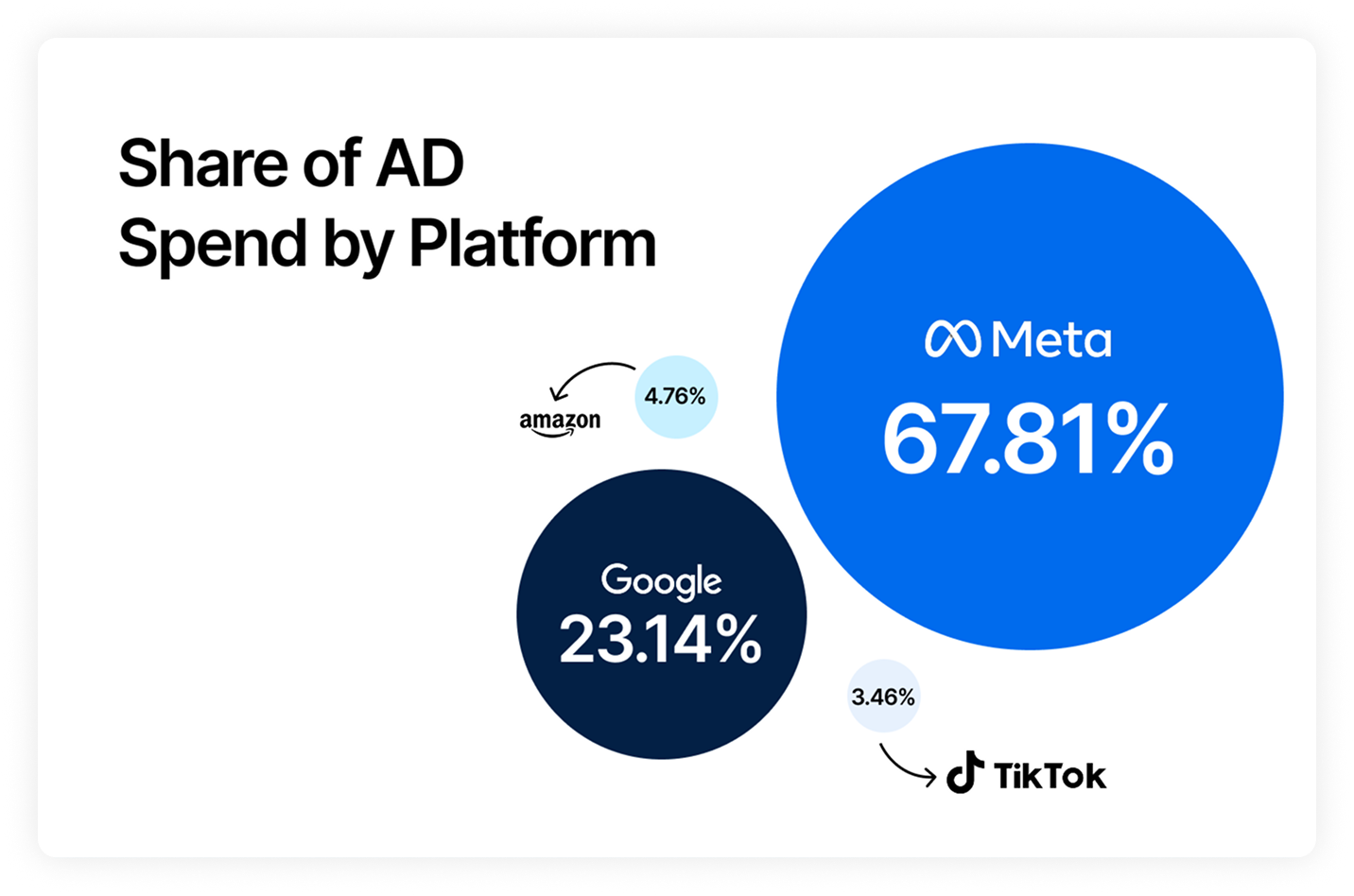
Body Copy: The following benchmarks compare advertising metrics from April 1-17 to the previous period. Considering President Trump first unveiled his tariffs on April 2, the timing corresponds with potential changes in advertising behavior among ecommerce brands (though it isn’t necessarily correlated).
